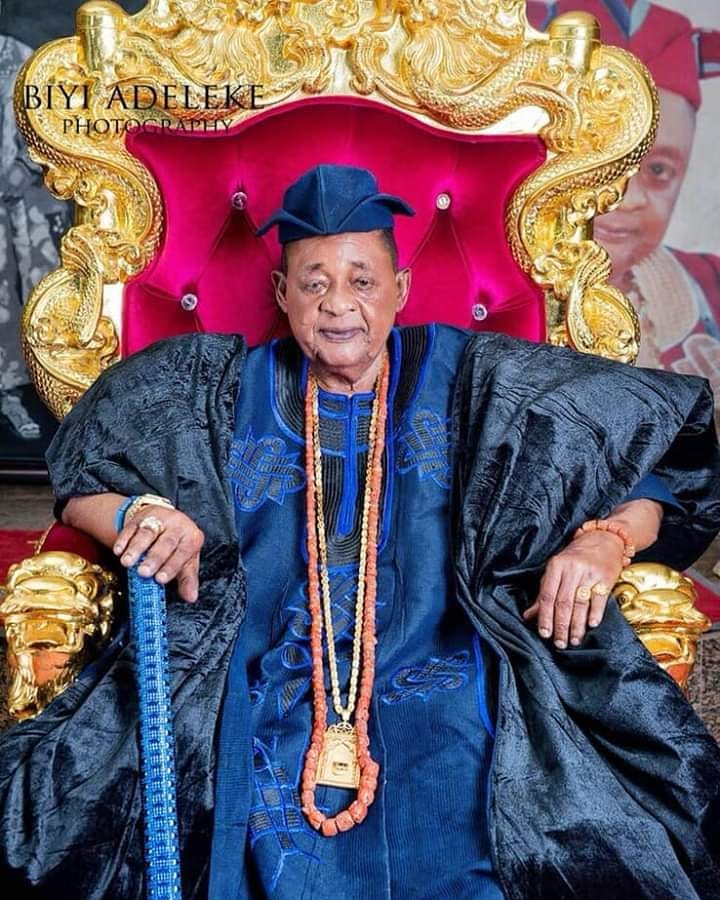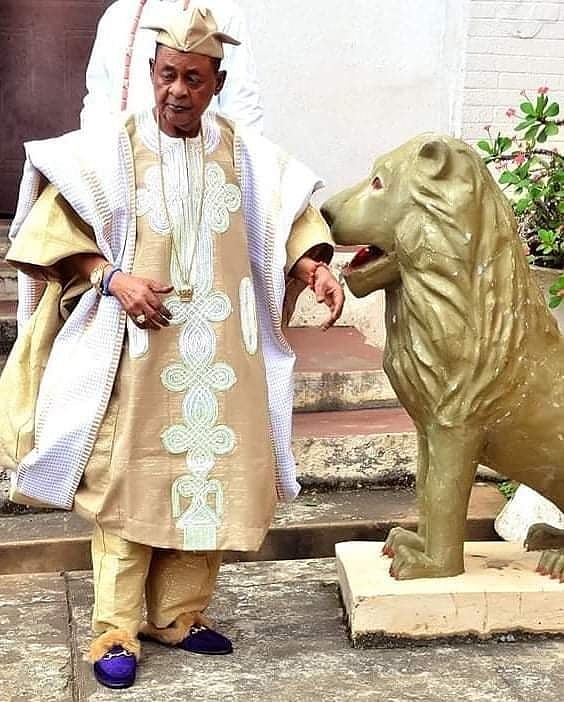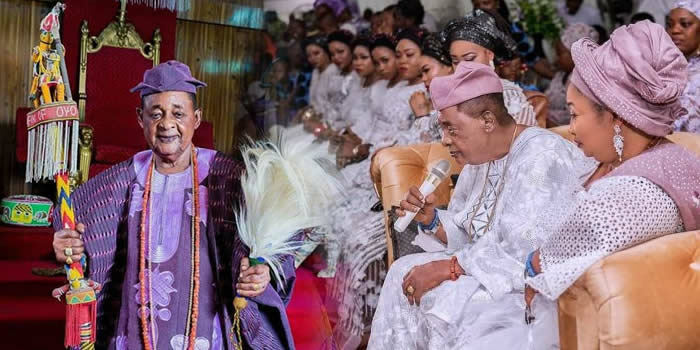Royal class distinctly marks the ambience, regalia and palace of the His Royal Majesty, Alaafin of Oyo, Oba Lamidi Adeyemi III. True to its heritage, the palace combines raw and old structures, parading clay and wood bearings around the exterior of its premises. I waited with my contact for a few minutes as the Alaafin was busy.
But when the tuneful sounds of talking drums pierced the labyrinths of the entrancing palace, followed by a mix of voices bellowing, ‘Kabiyesi o’, I knew that it was almost time to have a one-on-one encounter with the revered monarch.
Apart from his gait exuding grace, he was jovial and relaxed with those around him. No soothsayer was needed to know that the interview would be fun.

I went past the garage housing his luxury cars and was finally ushered into the king’s meeting chamber where the interview took place. In the serene milieu, the king unfolds his sharpest wits and words as the questions came. He shares the story of his childhood, wives, life as a monarch among other issues with KORE OGIDAN
Tell us about your background.
I was a fast learner and I had a very sharp memory as a child. I ascribe my sharp memory to my parents and environment. At the age of five, I was given an oriki (lineage praise) which belonged to my ancestors and I memorised it just from listening to my mother chanting it. I became dexterous and fluent in chanting the oriki at a very young age and because of this, I was bought a sekere and a drum, which I used in praising my father.
READ: Former Miss Moscow marries Malaysia’s King Muhammad V, after converting to Islam (Photo)
At the same age of five, I was taken away to a town called Iseyin, which is about 35 kilometres from Oyo to learn the Quran and I became very proficient in the Quran classes which I attended for a period at Ansar-Ud-Deen Primary School. I came back home to Oyo after the completion of my Quranic education. My father never wanted me to stay in the palace because he did not want me to be indulged by the treatment that princes and princesses were given in the palace. They weren’t allowed to be beaten or disciplined strictly and my father didn’t want me to get influenced by that. He wanted me to learn about life the proper way. So, he took me to Central Youth Practising School for my primary education where I stayed for a while. After this, I was taken to the palace of Oba Idowu Ademola II, the then Alake of Egbaland. Since he had no western education, my father wanted me to be trained in the palace. So, he took me to the Alake’s palace to get educated the western way. He wanted me to be trained in palace etiquette and have a strong educational background.
However, at this period, there was a commotion in the town and my ‘father’ was exiled from Abeokuta. He went to Osogbo, the capital of Osun State. When I was 10 years old, the Alake pressured my father to take me back home because he saw me as a promising young boy. He told my father that I shouldn’t be made to suffer unduly for the actions that I knew nothing about. My father then responded that God would make me excel in the end if it was written in my destiny. I came back home and instead of continuing my education, I was taken to stay with Sir Kofoworola Abayomi, my father’s friend, who was a medical doctor. When I stayed with him, I used to prepare his medical kit before he went to treat people. I had to memorise all the apparatus for the job and dared not forget any one of them. This helped me to tax my brain and I became very efficient at remembering things that even he might have forgotten. When I came to Lagos, I attended St. Gregory’s College, Ikoyi, for my secondary education. I enjoyed my secondary education because it was very thorough and interesting and I was extremely verbose. I was a member of the school’s debate team and that helped me in interacting with people from all parts of the world.
Did you enjoy the fact that you were constantly moving about as a kid?
I did because of the experiences I gained and the people I met who influenced me. If I were in other places and had missed out on the opportunity to experience what I did, I might not have been able to cope with the rigours and responsibilities I had to take up as the Alaafin. I was like a moving train, carrying people all over the place.
How did your father’s exile affect you as a young boy?
My father’s exile affected me both negatively and positively. I was in Lagos when he was exiled, as I didn’t stay very long in the palace because he moved me about quite frequently. My mother died when I was very young and because of the emotional attachment I had to my father, it hit me that I was in a way orphaned. When my mother died, he sent me away from home to feel the impact less and help me take my mind off the pain I must have been feeling. After his exile, I could have been a delinquent due to the circumstances but I realised that I had a purpose in life and decided to live right and uphold my family’s name. Before he was exiled, he always wanted me very close to him and it wasn’t until I had grown up that I realised that he was trying to pass a message to me. He taught me never to get upset or be malicious. He said many things to me that seemed like life lessons but I didn’t realise until I was older.
If you were not a king, what profession would you have chosen?
I would have been a lawyer because they are learned, not just educated like the rest of us. Lawyers are apostles trained in the temple of justice to rescue people from injustice. I would have chosen that profession because they help people more than we think. Look at the impact that has been made by the association of female lawyers who tackle the ills of domestic violence, rape and other related issues. They have rescued many children and exposed many wrongdoers.
If you had a chance at a second coming, would you still choose to be king?
In Yorubaland, there is no bigger achievement than becoming king. That is the highest position one can attain as a Yoruba man, regardless of profession. I believe that God always has a purpose (for one’s life) and there’s nothing else I’d rather do than what my capacity currently holds. As Alaafin, I am in full service of my people every minute of the day. I have several rooms where I host different activities and attend to issues relating to the needs of my people. My experience on the throne has been very tasking. I have to settle disputes and know all the laws; even the modern laws. If I am to come again to the world, I would definitely like to come back as a king.
What do you cherish the most about being the Alaafin of Oyo?
I enjoy the fact that I am keeping and upholding the covenant that I made during my installation as king. I am serving my people the best way that I can to the dictate of our cultural, historical and traditional norms. There are several processes of purification that one must go through and several pledges one makes before being installed as king. One must pledge to always be at the service of one’s people. When in doubt as to how best to take a decision, one must sleep on it; think properly. One must conform to the covenants one made before the shrines of one’s forefathers and defend and uphold and, if possible, die defending the heritage of one’s people. This is what I have done as king and I cherish the most that I have been able to achieve. The Alaafin must be courageous. If he isn’t, then what is he doing on the throne? I must be found worthy of character and in so many places, I have defined character to them differently.
READ: 22-year-old man arrested in Abuja for allegedly killing his father

How do you think Nigeria can further develop?
We all have a duty and a role to play and that is what we are doing. It is one thing to give advice and it is another thing to act. What do you do if your advice is not taken? From my throne, I have been able to contribute minimally, not as substantially as I would have liked. I have never allowed the capacity of the office I occupy to influence me adversely nor have I abused my authority as king in any way that would be detrimental to the people I represent. Governance is very delicate and it is easier to persuade government officials if they are educated. We can only give them advice. In football, 11 people go to represent a club or country and the mistake of one person can ruin the entire match; it is just like that in governance. The error of a leader can ruin the entire country.
Which sports do you enjoy?
I love all sports, except boxing. I play football very well. Back then, they used to call me ‘local Stanley Matthew’, after the British footballer, Stanley Matthew, who played football till he was 50 years old. I don’t support any football club because I would like to maintain my blood pressure and ensure that my emotion is in check. Supporting football teams affects people emotionally. Whenever Nigeria is playing, I support them but I limit myself to that and wish other teams good luck. I am also a good boxer. I have had over 56 bouts and lost two. In my bouts, only 10 (people) who contested with me lasted the distance. I won the others by knockout but I have never been knocked out. Let me tell you a little secret. Inwardly, I am not a very happy person; so, boxing is an interesting outlet for me. When you have a grudge, you don’t feel pain.
How would you describe yourself as a husband to many wives?
I did not propose to any of my wives. They desired to be with me because I sent them to school. After their university education, I told them to leave but they refused and insisted on staying with me here in the palace as my wives. The least educated of them has a Higher National Diploma and is now in the university. I don’t begrudge or offend women. Marriage is an institution that must be defended. Each partner has their role to play in the marriage. My wives have their individual quarters. God has given me some type of ability and grace to keep a woman, especially beautiful women. I don’t disclose my conversations or activities with one wife to another. I maintain a strict code of confidentiality. I have learnt that I must positively make an impact on people and make a great first impression. Of course, they (wives) sometimes have disagreements and conflicts of opinion but I have been ‘graced’ by God to know how to ensure that the conflicts don’t escalate.
How do you like to dress?
There is always a code of appearance for the Alaafin – whether in the palace or out. The nature of the ceremony and the scope of the outing usually determine how I dress. Even within the palace, I must be well dressed because visitors can come in at any time. I must be the epitome of the culture of the people I represent. Culture is the totality of man’s existence and I must not be found wanting, not only in my dressing, but in the entirety of the heritage. I don’t have to be too flashy when I am within the palace but I must look very presentable.
Do you still maintain friendship with people from your childhood?
I still do but sadly, many of them have passed on. When I turned 70, I posted the names of these friends and invited them to the palace. When I saw them, I shed tears because most of them had become very frail. I could not believe those were the same people I played sports with back then. That is one of the reasons I give thanks to God for my life.
How did you feel the first time you fell in love?
I have never approached a lady; they come to me. My first wife was a friend to my younger sister of blessed memory. My sister introduced her to me and though she wasn’t educated, she gave me the first lawyer in our family, my son, Tunde. I truthfully do not know the art of chasing women. I don’t go out to chase women. I am very stoic; I seldom laugh. Most times, it is impossible to know what is going on in my mind because you cannot read my emotions on my face and women don’t like that.
What has been your funniest experience travelling overseas together with your wives?
I haven’t had one of those where it is a funny experience. I travel with all my wives and I don’t hide them.
How do you react when you are angry?
I don’t react when I am angry because I know what I can do. The next action you take or words you say when in the heat of anger is never the correct one and that is something I learnt from a book I read. When you are angry, it is a time to reflect. You almost never see me get angry or being angry. I play more with people and dance a lot. I love old music with great lyrics that make one think. I like the music of Haruna Ishola, Ebenezer Obey, King Sunny Ade, Ayinde Barrister and many others like that. I was a chorister and I sing a lot. I am very cosmopolitan; anywhere you put me, I will adapt. It is the nature of every human to adapt.
What kind of parent are you?
I am a very good parent to my kids. When they were much younger, I used to wake them up at 5am and we would all jog together for about five miles daily and on weekends, about 10 kilometres. A few years ago when my son was in school in the UK, he called me to ask for allowance and I told him to jog to school instead of taking taxis. A few days after, other people had joined him. I encourage my children to be very independent and not live lavishly. They are just like me, very disciplined. I spend a lot of time with them and there is no dull moment when we are together. Most of my children have master’s degrees and the ones that are still in school will get theirs when they are done. This is to prepare them for the future. I encourage the ladies among them to be submissive to their husbands and never divulge the weaknesses of their husbands to anyone. That is the key to having a happy home.
What advice do you have for young people to have a fulfilled life?
They must prepare themselves for the future if they want to be very important. They must find a way to seek knowledge and adjust to circumstances. They must also ensure that they have goals in order to realise their potential. Nothing comes easily to anyone in life. Those who will rule the world in future are those who prepare themselves for it.
What is your favourite possession?
Books! I love books and I read a lot of them. Whenever I have any free time, I indulge myself in books of all types and genres.
What is your favourite food?
I like good food. I have trained myself to eat the right things and at the right time. I don’t drink and I don’t smoke. I don’t really have restrictions to what I eat but I don’t eat red meat. In the morning, I eat about two balls of akara with one cup of pap and plenty vegetables in the afternoon. I like ewedu mixed with vegetables. I like consuming bitter things because they help the pancreas, bladder and kidneys. Cooking is my specialty and before I became king, I cooked a lot. Till now, I cook every Sunday in the palace. The people around me and my subjects stay by me when I cook and learn a lot from my cooking skills.
What kind of movies do you like to watch?
I seldom watch films but when I do, it has to be a full length movie that is intelligently made. I like to be stirred when watching a movie. I also enjoy movies with plot twists and suspense where I can’t predict what will happen at the end. I don’t like movies that have very fluid plots. I love movies that particularly deal with women’s intrigues. That is where you learn that women are very sensible.
I also listen to news a lot.
You may also like to read; Catholic priest bags his 5th first class as he becomes a barrister






Discussion about this post